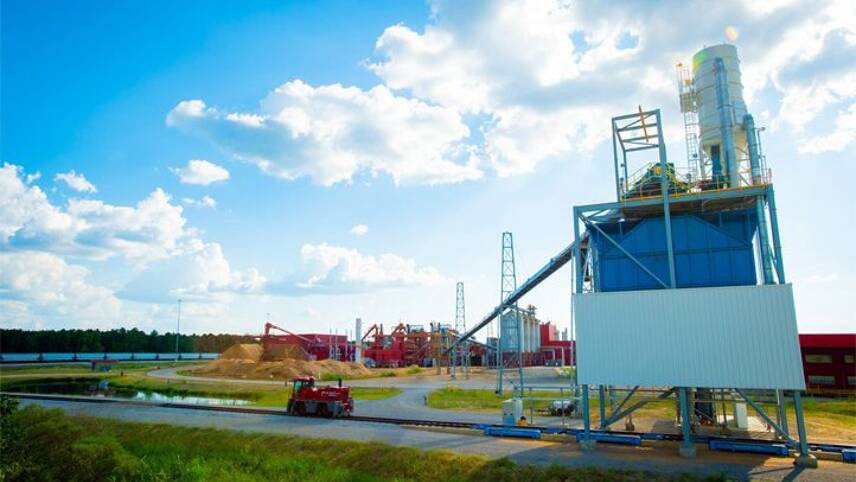Register for free and continue reading
Join our growing army of changemakers and get unlimited access to our premium content

The new rail line and wood pellet loading bay with sawmill residues in view at Drax LaSalle BioEnergy. Image Drax
The company has unveiled a new biomass sustainability policy built on the recommendations of Forest Research, the research agency of the Forestry Commission and the European Climate Foundation.
The new policy aligns to 15 recommendations, notably to favour biomass associated with restoration and conservation projects and a commitment to not take from sources linked to deforestation.
Drax Group’s chief executive Will Gardiner said: “We’re committed to continuously raising standards in biomass sustainability, so our sourcing policies must evolve as the science develops.
“With stronger policies in place and an independent board to challenge us every step of the way, we will be setting the standard for others to follow, which is important as sustainable biomass plays an increasing role in addressing climate change.”
Drax has agreed to work with academic institutions and non-profit organisations to meet its core commitments to reduce carbon dioxide emissions and protect the natural environment.
The company will also provide evidence and increase transparency on its biomass sourcing and impacts.
Former UK Government Chief Scientific Adviser Professor Sir John Beddington has agreed to chair a new IAB to oversee Drax’s progress.
IAB Chair Sir John Beddington said: “The IPCC and Committee on Climate Change both recognise that sustainably sourced biomass will play an important role in meeting climate change targets. I decided to chair the IAB because it’s vital that biomass is sourced sustainably and takes the latest scientific thinking into account.
“As the science evolves, we will make recommendations to ensure that the biomass used at Drax makes a positive contribution to our climate and the environment.”
Biomass plans
Drax has unveiled numerous biomass and carbon capture projects in recent years. The company co-located its sawmill and new biomass plant in LaSalle, Louisiana, and began trialling carbon capture and storage (CCS) on one of the four biomass units at its power station in Yorkshire.
The CCS array, which is being used in partnership with C-Capture, first began capturing carbon in February. Drax claims that it is the first of its kind anywhere around the globe and could eventually enable its Yorkshire site – a former coal-fired plant – to become the world’s first “negative emissions” power station.
In spite of its decarbonisation efforts, Drax has faced several bouts of criticism over its environmental credentials in recent months.
Last year, environmental law firm ClientEarth took legal action against Drax’s plans to open a four-turbine gas generation facility at its Selby power plant in Yorkshire, claiming that the project breaches the Government’s planning and climate change policies. Drax denied that its plans would put the UK at risk of missing its Fifth Carbon Budget.
Drax has also been threatened with legal action over its use of biomass, with plaintiffs from six countries having filed a lawsuit with the European General Court in Luxembourg in February. The plaintiffs claimed that forest-grown wood shouldn’t be counted as a source of renewable energy under the EU’s 2018 Renewable Energy Directive (RED) II.
Commenting on the new biomass policy, the Natural Resources Defense Council’s senior advocate Sasha Stashwick said: “If Drax was serious about wanting to use the `latest science,’ it would end its use of harmful biomass energy. The science is clear, and no amount of satellite imagery or sham `sustainability’ certification can justify shipping millions of tons of trees in from around the world to burn as fuel for electricity generation.”
Matt Mace


Please login or Register to leave a comment.